人教版八年级英语下册Unit 2 I'll help to clean up the city parks.Section B(2a---2e)课件(共22张PPT)
文档属性
| 名称 | 人教版八年级英语下册Unit 2 I'll help to clean up the city parks.Section B(2a---2e)课件(共22张PPT) | 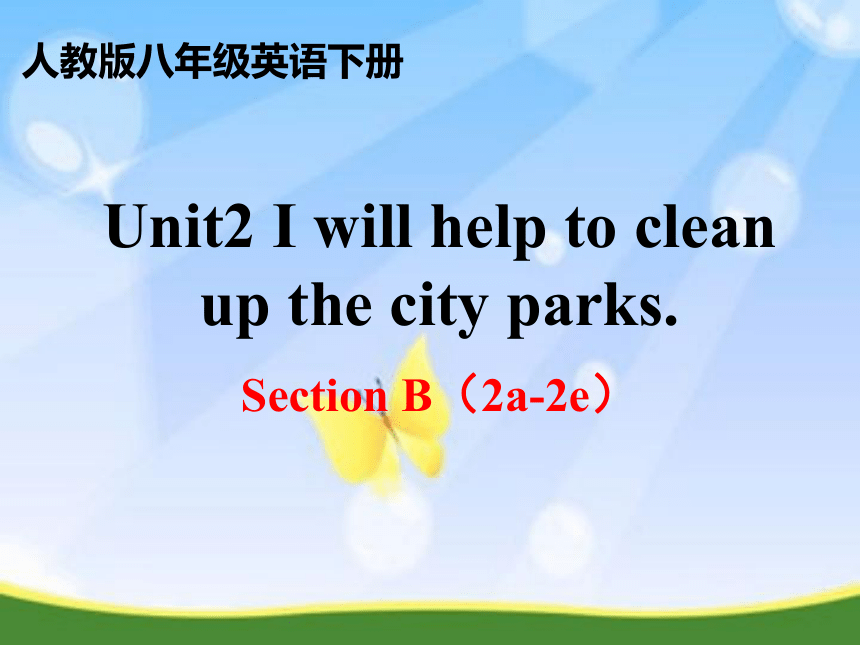 | |
| 格式 | zip | ||
| 文件大小 | 2.4MB | ||
| 资源类型 | 教案 | ||
| 版本资源 | 人教新目标(Go for it)版 | ||
| 科目 | 英语 | ||
| 更新时间 | 2021-03-21 10:15:17 | ||
图片预览

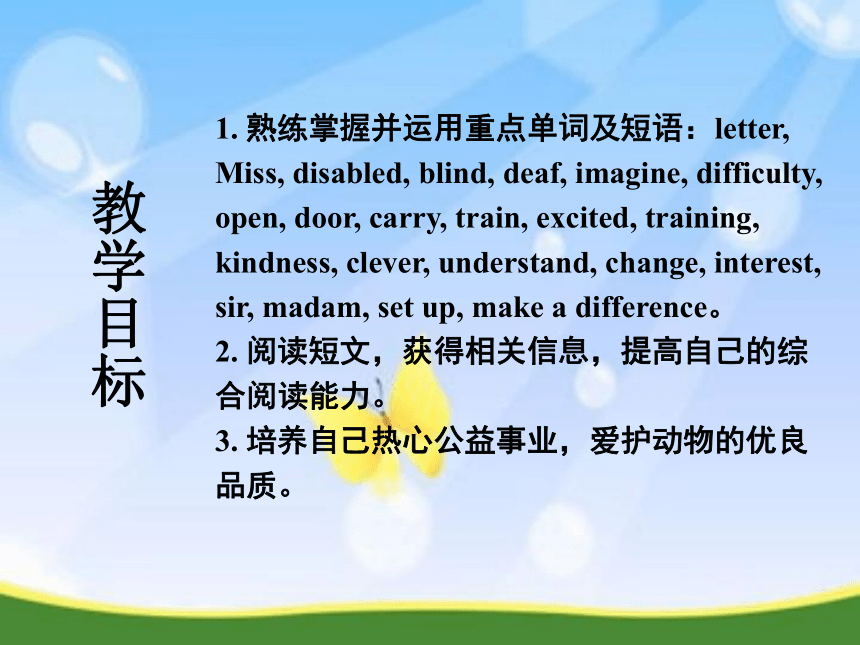
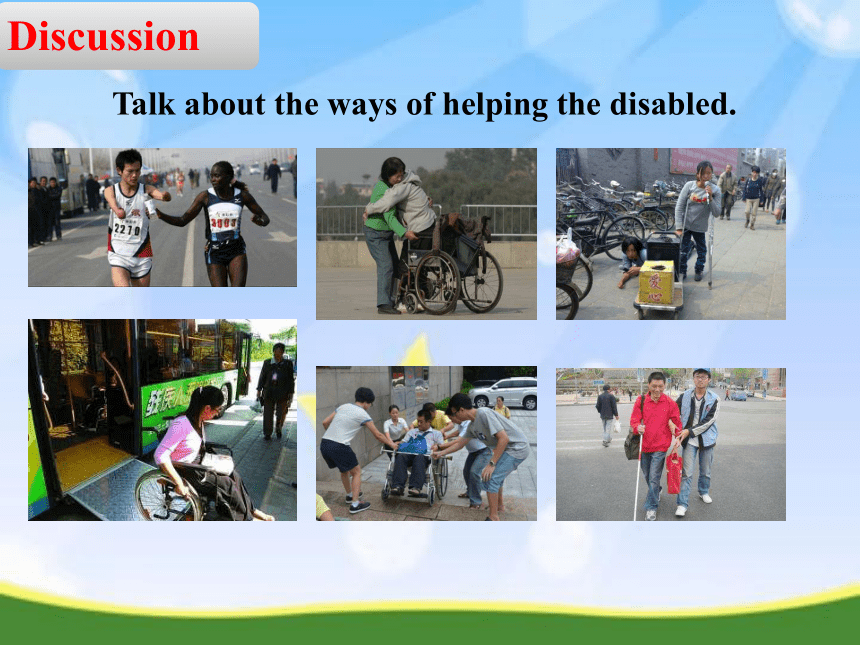
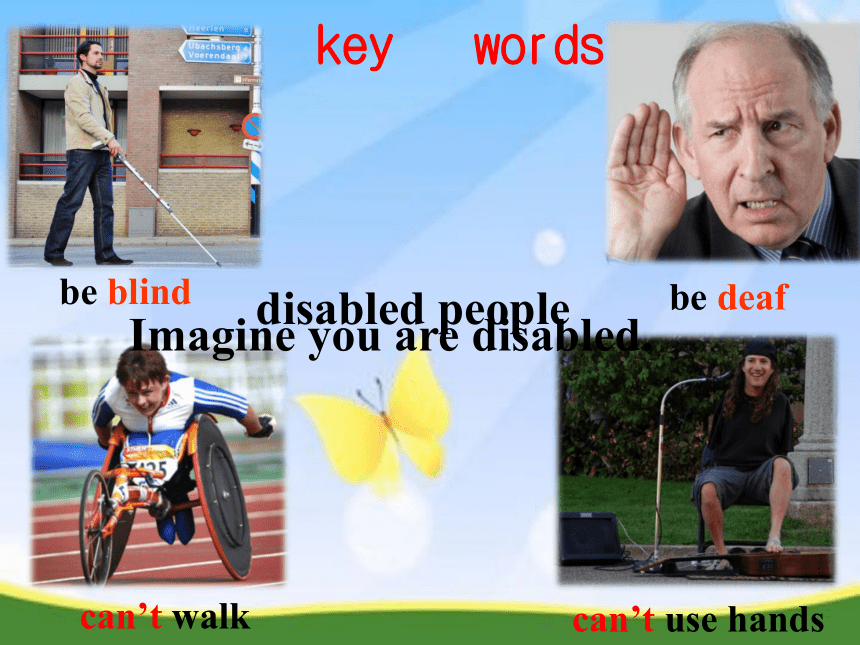
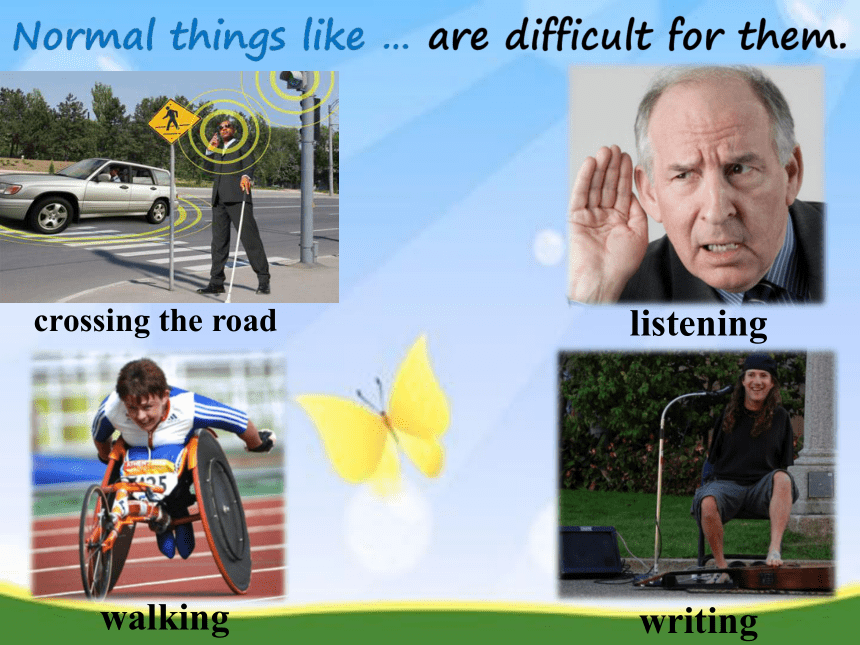
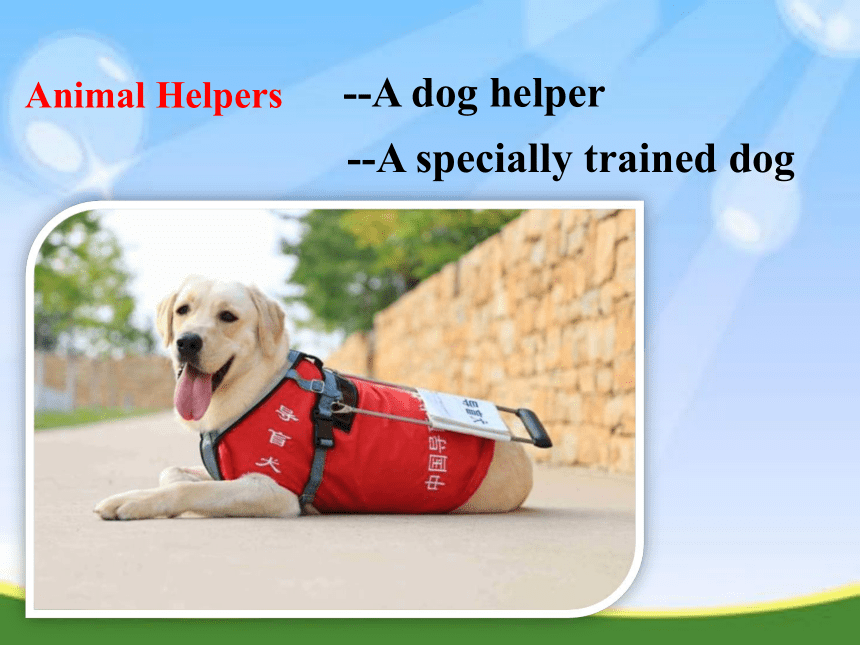
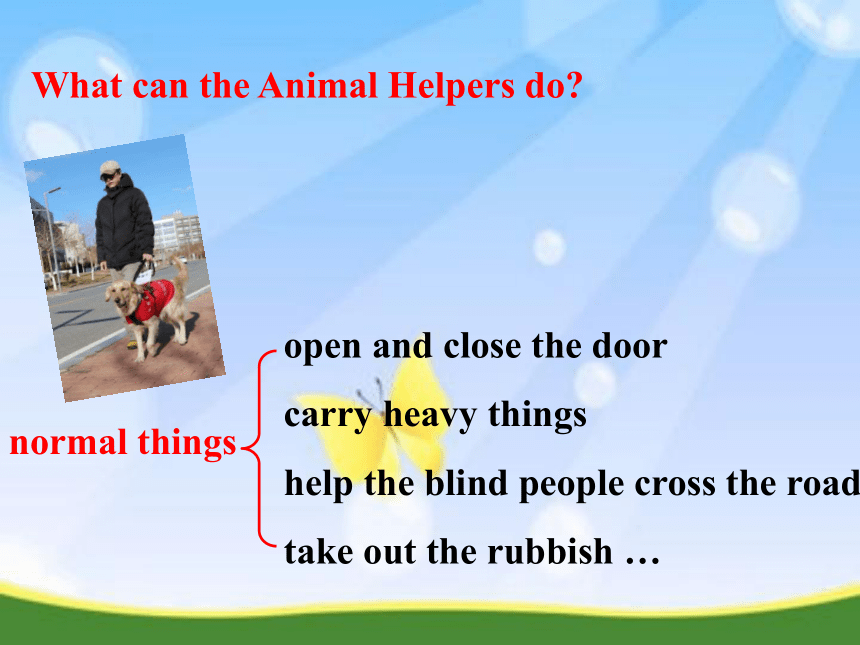
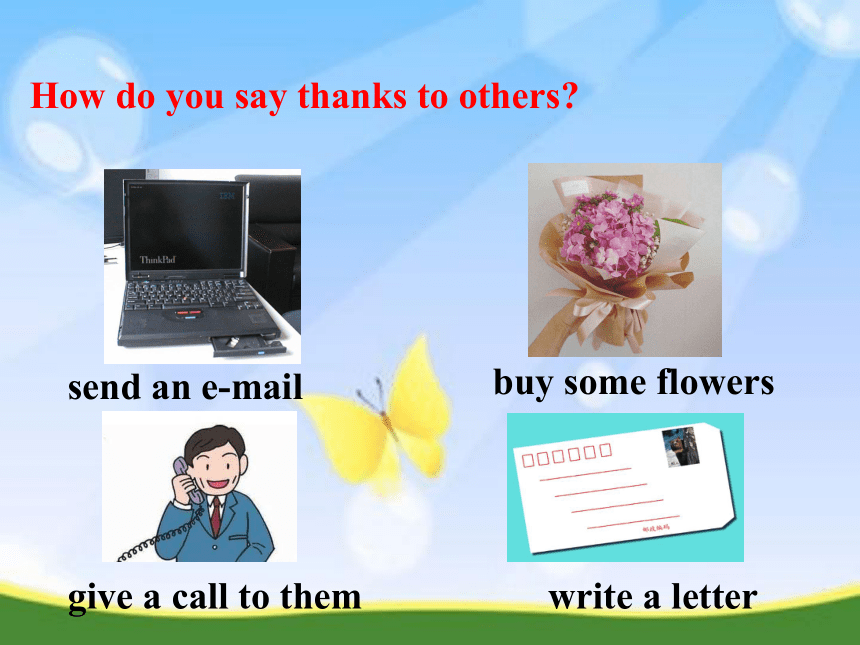
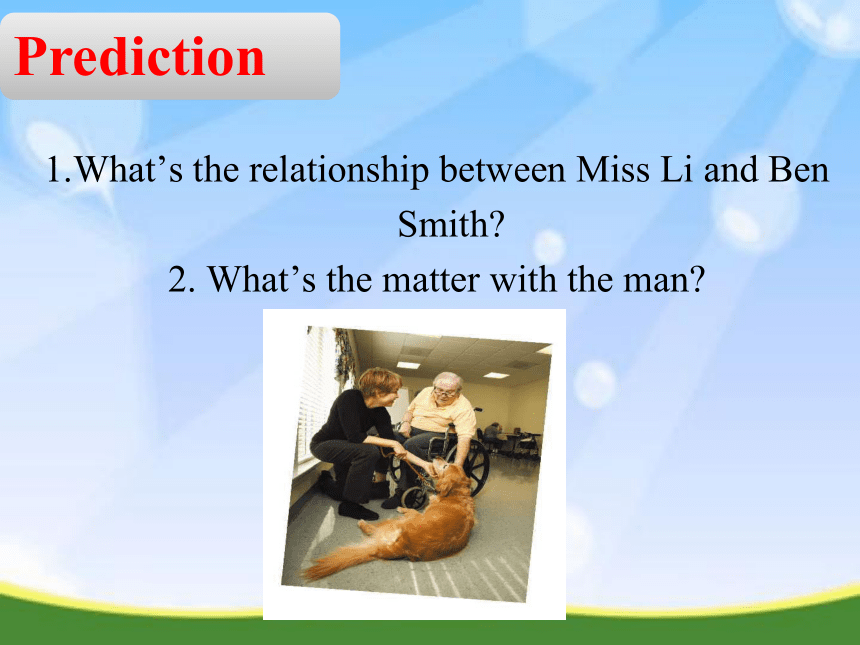
文档简介
(共22张PPT)
人教版八年级英语下册
Section
B(2a-2e)
Unit2
I
will
help
to
clean
up
the
city
parks.
1.
熟练掌握并运用重点单词及短语:letter,
Miss,
disabled,
blind,
deaf,
imagine,
difficulty,
open,
door,
carry,
train,
excited,
training,
kindness,
clever,
understand,
change,
interest,
sir,
madam,
set
up,
make
a
difference。
2.
阅读短文,获得相关信息,提高自己的综合阅读能力。
3.
培养自己热心公益事业,爱护动物的优良品质。
教学目标
Discussion
Talk
about
the
ways
of
helping
the
disabled.
be
blind
can’t
walk
be
deaf
can’t
use
hands
disabled
people
Imagine
you
are
disabled.
key
words
crossing
the
road
walking
listening
writing
--A
specially
trained
dog
--A
dog
helper
Animal
Helpers
normal
things
What
can
the
Animal
Helpers
do?
open
and
close
the
door
carry
heavy
things
help
the
blind
people
cross
the
road
take
out
the
rubbish
…
How
do
you
say
thanks
to
others?
write
a
letter
send
an
e-mail
give
a
call
to
them
buy
some
flowers
1.What’s
the
relationship
between
Miss
Li
and
Ben
Smith?
2.
What’s
the
matter
with
the
man?
Prediction
Skim
the
letter
and
answer
the
questions.
1.
What
kind
of
letter
is
it?
2.
Who
wrote
the
letter
to
Miss
Li?
Why?
Ben
Smith.
Because
she
helped
him
make
it
possible
to
have
a
special
trained
dog.
It’s
a
thank-you
letter.
2a
Fast-reading
Dear
Miss
Li,
I’d
like
to
thank
you
for
sending
money
to
“Animal
Helpers”,
an
organization
set
up
to
help
disabled
people.
For
sure,
you
have
helped
make
it
possible
for
me
to
have
“Lucky”,
who
has
filled
my
life
with
pleasure.
Let
me
tell
you
my
story.
Being
blind,
deaf,
unable
to
walk,
or
use
your
hands
easily
is
something
that
most
people
cannot
imagine.
But
there
are
many
people
who
face
these
challenges,
and
I
am
one
of
them.
Because
I
can’t
use
my
arms
or
legs
well,
normal
thingslike
answering
the
telephone,
opening
and
shutting
doors,
or
carrying
things
have
always
been
difficult
for
me.
Then
one
day
last
year,
a
friend
of
minesaid
that
she
would
like
to
help
me
out.
She
said
she
would
talk
to
“Animal
Helpers”
to
see
if
it
would
be
possible
for
me
to
get
a
specially
trained
dog.
she
also
thought
a
dog
might
cheer
me
up.
I
told
her
that
I
love
animals,
and
that
I’d
love
to
have
a
dog.
After
six
months
of
training
with
a
dog
at
“Animal
Helpers”,
I
was
able
to
bring
him
home.
My
dog’s
name
is
“Lucky”
–
a
good
name
for
him
because
I
feel
very
lucky
to
have
him.
You
see,
I’m
only
able
to
have
a
:dog-helper”
because
of
your
kind
donation!
How
does
Lucky
help
me,
you
might
ask?
Well,
he
has
been
trained
to
understand
different
instructions.
for
example,
I
say,
“Lucky!
Fetch
my
book,”
and
he
does
it
at
once.
He
is
very
clever,
and
understands
many
English
words,
even
some
difficult
ones
like
“upstairs”.
Lucky
is
an
amazing
dog.
I’ll
send
you
a
photo
of
him
if
you
like,
and
I
could
show
you
how
he
helps
me
too
one
day.
And
so
I
thank
you
again
for
supporting
“Animal
Helpers”.
It
is
very
important
that
this
organization
does
not
run
out
of
money.
Your
donation
is
greatly
appreciated
and
the
money
is
well
used
to
helpdisabled
people
like
me.
Best
wishes,
Ben
Smith
to
from
·
A
thank-you
letter
It
is
an
organization
to
help
disabled
people.
A
disabled
man.
A
person
who
gave
money
to
Animal
Helpers.
A
special
trained
dog.
Ben
Smith
Miss
Li
Lucky
Animal
Helpers
Skimming
Read
and
match
Para.
1
________
_____________
Para.
4
____________
__________________
Get
the
main
ideas
of
different
paragraphs.
Para.
3
____________
__________________
Para.
2
________
_____________
thanks
to
Miss
Li.
Lucky
helps
Ben
with
difficulties.
Ben
has
some
difficulties.
Ben
thanked
Miss
Li
again
for
changing
his
life.
Ben
showed
D.
B.
C.
A.
1.
The
writer
can’t
use
her
arms
or
legs
well.
2.
Lucky
was
brought
to
the
writer
by
her
friend.
3.
They
have
been
trained
at
“Animal
helpers”
for
seven
months.
4.
A
dog-helper
is
for
those
who
are
disabled.
5.
Lucky
can
understand
different
orders.
Read
and
circle
“T”
or
“F”.
T
T
F
T
F
Careful-reading
1.
group
(adj.
/
n.
)
___________________________________
2.
disabled
(adj.
/
adv.
)
__________________________________
3.
difference
(adv.
/
n.
)
___________________________________
We’d
better
go
in
a
group.
Look
at
the
list
of
words
below.
Circle
the
part
of
speech
of
each
word
and
make
your
own
sentences
with
these
words.
I
know
a
lot
of
disabled
people
need
our
help.
Can
you
find
the
differences
of
the
two
pictures?
2c
4.
imagine
(v.
/
n.
)
__________________________________
5.
difficulties
(n.
/
adj.
)
_________________________________
6.
normal
(adv.
/
adj.
)
__________________________________
7.
training
(adv.
/
n.
)
__________________________________
8.
kindness
(n.
/
v.
)
__________________________________
You
can
easily
imagine
my
surprise.
Each
family
has
its
own
difficulties.
A
person'
s
normal
temperature
is
37
degrees
Centigrade.
Nurses
have
several
years
of
training.
Good
looks
are
not
as
important
as
kindness.
Use
the
information
in
the
letter
to
make
true
sentences
by
matching
the
different
parts.
SUBJECT
Miss
Li
Ben
Smith
Lucky
Animal
Helpers
VERB
can
get
trains
sent
is
OBJECT
unable
to
move
well.
money
to
Animal
Helpers.
animals
like
Lucky.
things
for
disabled
people.
2d
set
up
建起;设立
e.g.
Let’s
set
up
our
tent
by
the
river.
我们在河边搭建帐篷吧。
1.
I’m
sure
you
know
that
this
group
was
set
up
to
help
disabled
people
like
me.
Language
points
disabled
adj.
丧失能力的;有残疾的
dis
(否定前缀)
+
able
(能够)
disabled
make
a
difference
影响;有作用
e.g.
It
would
make
a
big
difference
to
my
life.
这会对我的生活产生很大影响。
2.
Lucky
makes
a
big
difference
to
my
life.
difficult
adj.
困难的
difficulty
n.困难;难题
e.g.
When
you’re
in
difficulty,
ask
me
for
help.
当你遇到困难时,向我求助。
3.
…but
many
people
have
these
difficulties.
excited
意为“激动的”,人作主语。
exciting
意为“另人兴奋的”,常用于修饰事物。
4.
I
love
animals
and
I
was
excited
about
the
idea
of
having
a
dog.
e.g.
The
boy
was
too
excited
to
go
to
sleep.
小男孩太兴奋了,以至于不能入睡。
I
have
some
exciting
news
for
you.
我告诉你一些另人兴奋的消息。
e.g.
It
was
clever
of
him
to
find
the
way
here.
他能找到这儿来真是聪明。
clever
adj.
聪明的
5.Lucky
is
very
clever
and
understands
many
English
words.
understand
v.
理解;领会
(understood)
e.g.
This
grammar
is
easy
to
understand.
这本语法书很容易理解。
人教版八年级英语下册
Section
B(2a-2e)
Unit2
I
will
help
to
clean
up
the
city
parks.
1.
熟练掌握并运用重点单词及短语:letter,
Miss,
disabled,
blind,
deaf,
imagine,
difficulty,
open,
door,
carry,
train,
excited,
training,
kindness,
clever,
understand,
change,
interest,
sir,
madam,
set
up,
make
a
difference。
2.
阅读短文,获得相关信息,提高自己的综合阅读能力。
3.
培养自己热心公益事业,爱护动物的优良品质。
教学目标
Discussion
Talk
about
the
ways
of
helping
the
disabled.
be
blind
can’t
walk
be
deaf
can’t
use
hands
disabled
people
Imagine
you
are
disabled.
key
words
crossing
the
road
walking
listening
writing
--A
specially
trained
dog
--A
dog
helper
Animal
Helpers
normal
things
What
can
the
Animal
Helpers
do?
open
and
close
the
door
carry
heavy
things
help
the
blind
people
cross
the
road
take
out
the
rubbish
…
How
do
you
say
thanks
to
others?
write
a
letter
send
an
give
a
call
to
them
buy
some
flowers
1.What’s
the
relationship
between
Miss
Li
and
Ben
Smith?
2.
What’s
the
matter
with
the
man?
Prediction
Skim
the
letter
and
answer
the
questions.
1.
What
kind
of
letter
is
it?
2.
Who
wrote
the
letter
to
Miss
Li?
Why?
Ben
Smith.
Because
she
helped
him
make
it
possible
to
have
a
special
trained
dog.
It’s
a
thank-you
letter.
2a
Fast-reading
Dear
Miss
Li,
I’d
like
to
thank
you
for
sending
money
to
“Animal
Helpers”,
an
organization
set
up
to
help
disabled
people.
For
sure,
you
have
helped
make
it
possible
for
me
to
have
“Lucky”,
who
has
filled
my
life
with
pleasure.
Let
me
tell
you
my
story.
Being
blind,
deaf,
unable
to
walk,
or
use
your
hands
easily
is
something
that
most
people
cannot
imagine.
But
there
are
many
people
who
face
these
challenges,
and
I
am
one
of
them.
Because
I
can’t
use
my
arms
or
legs
well,
normal
thingslike
answering
the
telephone,
opening
and
shutting
doors,
or
carrying
things
have
always
been
difficult
for
me.
Then
one
day
last
year,
a
friend
of
minesaid
that
she
would
like
to
help
me
out.
She
said
she
would
talk
to
“Animal
Helpers”
to
see
if
it
would
be
possible
for
me
to
get
a
specially
trained
dog.
she
also
thought
a
dog
might
cheer
me
up.
I
told
her
that
I
love
animals,
and
that
I’d
love
to
have
a
dog.
After
six
months
of
training
with
a
dog
at
“Animal
Helpers”,
I
was
able
to
bring
him
home.
My
dog’s
name
is
“Lucky”
–
a
good
name
for
him
because
I
feel
very
lucky
to
have
him.
You
see,
I’m
only
able
to
have
a
:dog-helper”
because
of
your
kind
donation!
How
does
Lucky
help
me,
you
might
ask?
Well,
he
has
been
trained
to
understand
different
instructions.
for
example,
I
say,
“Lucky!
Fetch
my
book,”
and
he
does
it
at
once.
He
is
very
clever,
and
understands
many
English
words,
even
some
difficult
ones
like
“upstairs”.
Lucky
is
an
amazing
dog.
I’ll
send
you
a
photo
of
him
if
you
like,
and
I
could
show
you
how
he
helps
me
too
one
day.
And
so
I
thank
you
again
for
supporting
“Animal
Helpers”.
It
is
very
important
that
this
organization
does
not
run
out
of
money.
Your
donation
is
greatly
appreciated
and
the
money
is
well
used
to
helpdisabled
people
like
me.
Best
wishes,
Ben
Smith
to
from
·
A
thank-you
letter
It
is
an
organization
to
help
disabled
people.
A
disabled
man.
A
person
who
gave
money
to
Animal
Helpers.
A
special
trained
dog.
Ben
Smith
Miss
Li
Lucky
Animal
Helpers
Skimming
Read
and
match
Para.
1
________
_____________
Para.
4
____________
__________________
Get
the
main
ideas
of
different
paragraphs.
Para.
3
____________
__________________
Para.
2
________
_____________
thanks
to
Miss
Li.
Lucky
helps
Ben
with
difficulties.
Ben
has
some
difficulties.
Ben
thanked
Miss
Li
again
for
changing
his
life.
Ben
showed
D.
B.
C.
A.
1.
The
writer
can’t
use
her
arms
or
legs
well.
2.
Lucky
was
brought
to
the
writer
by
her
friend.
3.
They
have
been
trained
at
“Animal
helpers”
for
seven
months.
4.
A
dog-helper
is
for
those
who
are
disabled.
5.
Lucky
can
understand
different
orders.
Read
and
circle
“T”
or
“F”.
T
T
F
T
F
Careful-reading
1.
group
(adj.
/
n.
)
___________________________________
2.
disabled
(adj.
/
adv.
)
__________________________________
3.
difference
(adv.
/
n.
)
___________________________________
We’d
better
go
in
a
group.
Look
at
the
list
of
words
below.
Circle
the
part
of
speech
of
each
word
and
make
your
own
sentences
with
these
words.
I
know
a
lot
of
disabled
people
need
our
help.
Can
you
find
the
differences
of
the
two
pictures?
2c
4.
imagine
(v.
/
n.
)
__________________________________
5.
difficulties
(n.
/
adj.
)
_________________________________
6.
normal
(adv.
/
adj.
)
__________________________________
7.
training
(adv.
/
n.
)
__________________________________
8.
kindness
(n.
/
v.
)
__________________________________
You
can
easily
imagine
my
surprise.
Each
family
has
its
own
difficulties.
A
person'
s
normal
temperature
is
37
degrees
Centigrade.
Nurses
have
several
years
of
training.
Good
looks
are
not
as
important
as
kindness.
Use
the
information
in
the
letter
to
make
true
sentences
by
matching
the
different
parts.
SUBJECT
Miss
Li
Ben
Smith
Lucky
Animal
Helpers
VERB
can
get
trains
sent
is
OBJECT
unable
to
move
well.
money
to
Animal
Helpers.
animals
like
Lucky.
things
for
disabled
people.
2d
set
up
建起;设立
e.g.
Let’s
set
up
our
tent
by
the
river.
我们在河边搭建帐篷吧。
1.
I’m
sure
you
know
that
this
group
was
set
up
to
help
disabled
people
like
me.
Language
points
disabled
adj.
丧失能力的;有残疾的
dis
(否定前缀)
+
able
(能够)
disabled
make
a
difference
影响;有作用
e.g.
It
would
make
a
big
difference
to
my
life.
这会对我的生活产生很大影响。
2.
Lucky
makes
a
big
difference
to
my
life.
difficult
adj.
困难的
difficulty
n.困难;难题
e.g.
When
you’re
in
difficulty,
ask
me
for
help.
当你遇到困难时,向我求助。
3.
…but
many
people
have
these
difficulties.
excited
意为“激动的”,人作主语。
exciting
意为“另人兴奋的”,常用于修饰事物。
4.
I
love
animals
and
I
was
excited
about
the
idea
of
having
a
dog.
e.g.
The
boy
was
too
excited
to
go
to
sleep.
小男孩太兴奋了,以至于不能入睡。
I
have
some
exciting
news
for
you.
我告诉你一些另人兴奋的消息。
e.g.
It
was
clever
of
him
to
find
the
way
here.
他能找到这儿来真是聪明。
clever
adj.
聪明的
5.Lucky
is
very
clever
and
understands
many
English
words.
understand
v.
理解;领会
(understood)
e.g.
This
grammar
is
easy
to
understand.
这本语法书很容易理解。
同课章节目录
- Unit 1 What's the matter?
- Section A
- Section B
- Unit 2 I'll help to clean up the city parks.
- Section A
- Section B
- Unit 3 Could you please clean your room?
- Section A
- Section B
- Unit 4 Why don't you talk to your parents?
- Section A
- Section B
- Unit 5 What were you doing when the rainstorm came
- Section A
- Section B
- Review of Units 1-5
- Unit 6 An old man tried to move the mountains.
- Section A
- Section B
- Unit 7 What's the highest mountain in the world?
- Section A
- Section B
- Unit 8 Have you read Treasure Island yet?
- Section A
- Section B
- Unit 9 Have you ever been to a museum?
- Section A
- Section B
- Unit 10 I've had this bike for three years.
- Section A
- Section B
